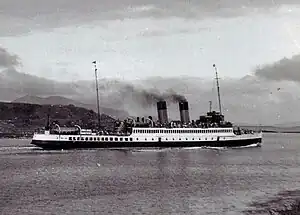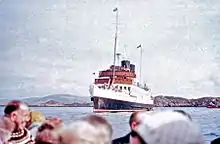TS King George V
TS King George V (the "KGV") was a pioneering Clyde passenger turbine steamer, built in 1926. She was a popular boat, seeing service to Inveraray and later based in Oban, and withdrawn in 1974.
 TS King George V leaving Oban in 1967 | |
| History | |
|---|---|
| Name | TS/RMS King George V |
| Namesake | King George V |
| Owner |
|
| Builder | |
| Yard number | 1182 |
| Launched | 29 April 1926 |
| In service | 1926 |
| Out of service | 1974 |
| Homeport | Glasgow |
| Fate | Scrapped, 1984 |
| General characteristics | |
| Type | Passenger turbine steamer |
| Tonnage | 789 GRT; 320 NT |
| Length | 260.6 ft (79.4 m) |
| Beam | 32.1 ft (9.8 m) |
| Draft | 7 ft (2.1 m) |
| Installed power | 7 turbines |
| Propulsion | twin screw |
| Speed | 16 kn (service) |

History

King George V was built by William Denny and Brothers for the Turbine Steamers Ltd[2] as a pioneering turbine powered vessel intended for longer routes. She passed to the ownership of David MacBrayne Ltd in October 1935, when plans to rename her were never enacted.[3] Displaced by MV Columba, she was withdrawn from service in 1974. Several attempts were made to preserve her as a floating pub or restaurant, but all failed. King George V was burnt out at Cardiff docks in 1981 and scrapped in 1984.[2]

Layout
King George V was novel in design, providing spacious accommodation with an enclosed promenade deck, the saloon extending the full width of the hull and half the length of the vessel. Above this was an observation deck. The restaurant was aft on the main deck, with large observation windows.[4]
Her machinery was even more innovative. Seven turbines, with two very high pressure boilers, were linked by gears to twin propellers. The boilers had to be replaced after tubes burst. A first incident happened off Irvine at the end of the 1927 season, when two firemen were killed. A second incident was in Kilbrannan Sound, with no loss of life.[4] She was re-boilered in 1929 and again 1935. In 1935, one turbine was removed to simplify the power system and two new, slightly broader funnels were fitted.
A main mast was fitted in 1952, radar in 1958 and in 1959, inflatable life rafts replaced two of her lifeboats.[3] She was further modernised in the winter refits of 1960 and 1961.
Service
King George V was initially mainly used on the Inveraray service but also visited Campbeltown.[2] She became a much loved ship. After 1935, she was based in Oban cruising round Mull, to Iona, Staffa and Fort William.
In World War II, she was requisitioned as a troop carrier, initially based at Southampton. In 1940, she evacuated troops from Rotterdam, Ostend, Calais, Boulogne and famously, Dunkirk, landing 4300 men at Dover.[2] Returning to the Clyde in 1941 for tendering duties, she carried Prime Minister, Winston Churchill to his battleship en route to the Atlantic Conference.[4]
After the war, she resumed MacBrayne cruises on the Clyde in 1946, including the summer Ardrishaig mail service.[2] She was back to Oban in 1947 and each summer until withdrawn in 1974. In her final years she also undertook charters, including one to Bangor in Ireland.[4]
Footnotes
- "TSS King George V". Clydesite: Shipping Times. Archived from the original on 27 April 2005. Retrieved 20 April 2011.
{{cite web}}: CS1 maint: unfit URL (link) - "TS King George V". Clyde Turbine Steamer Foundation. Retrieved 20 April 2011.
- "TS King George V". Paddle Steamer Picture Gallery. Archived from the original on 17 October 2012. Retrieved 20 April 2011.
- "TS King George V". Clyde Steamers. Archived from the original on 30 July 2010. Retrieved 20 April 2011.
{{cite web}}: CS1 maint: unfit URL (link)